Why the pipes in the apartment are buzzing: determining the causes and analyzing how to fix the problem
Residents of apartment buildings are often bothered by strange sounds that are heard in communication systems. Agree, it is unlikely that anyone will turn to the Housing Office or call the plumbing with any slight hum or vibration. Although such sounds may well signal an emergency on the highway.
In order not to create unnecessary panic, it is necessary to understand why the pipes in the apartment are buzzing and find out what measures should be taken to eliminate extraneous noise. It is important to understand what situation requires an immediate call of specialists, and when you can do it yourself.
The answers to these questions are detailed in the article. We examined the nature and reasons for the rumble of water, sewer and heating pipelines in an apartment building.
The content of the article:
Noise in pipelines is discomfort
Residents of high-rise buildings often come across sounds (knocking, buzzing, whistling) that can be heard in various communication systems: plumbing, heating, sewage.
Sometimes such noises are periodic, in other cases they sound constantly, causing a lot of inconvenience to the inhabitants of the apartments.

It is important to know that buzzing and other sounds are not only unpleasant, but can also indicate serious problems in life support systems. Try to take action immediately, understanding the causes of the noise, without waiting for it to pass by itself.
Extraneous sounds in the water supply
Most often incomprehensible noises reach residents from the water supply system.Sounds can be caused by a variety of reasons: disturbances in centralized communications, improper connection of plumbing fixtures, defects in the construction of the riser, malfunction of the mixers.
To correctly identify the source of the malfunction, you should first listen to the noise to determine where it comes from and what it looks like.
Most often from water pipes you hear:
- monotonous hum;
- buzz with the transition to a whistle;
- occasionally knocking;
- a loud sharp sound, which when opening the tap can be accompanied by strong vibration.
Let us consider in detail the causes of these noises.
The constant buzz in the pipes
The most annoying extraneous sound is the monotonous buzz in the water pipes. Most often, such noises are heard in "age" buildings, the operation of which has been going on for more than a dozen years.
A constant hum can be caused by a variety of reasons.
Reason # 1. Defects in a centralized system. If the sound comes from the basement, and from there spreads throughout the house, its cause is the central pipeline.
This is a common problem associated with the fact that in buildings of the Soviet era, communications made of steel were usually used, the service life of which had long expired.
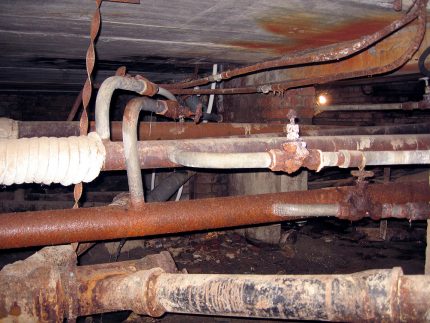
Under the influence of corrosion, metal elements sooner or later begin to collapse; cracks or fistulas form in them, from which water seeps.
It is extremely difficult to fix the defect on your own in this case; it is better to entrust the repair to professionals by contacting the Housing Office. As a rule, after the repair, unpleasant sounds disappear.
Reason number 2. Sometimes noises in the basement water supply lines can occur even when the pipes are in good condition. Their cause may be an open vent or an incompletely closed plug. Similar problems are also easily fixed by employees of specialized services.
Reason # 3. Overly closely spaced pipe bends can become the cause of extraneous sounds from the basement. With the contact of areas vibrating from the pressure of water, a hum can occur, which reaches the inhabitants of the apartments.
A simple and effective solution to this problem is to process each of the pipes with high-quality foam insulation.
Reason No. 4. Humming may be caused by using elements having different diameters in the pipeline. When connecting different-format pipes with their fitting, the water flow is disturbed, due to which extraneous noise arises.
In this case, it is better for the residents of the house to contact the Housing Office with a collective statement regarding the repair of the water supply system or riser replacement.
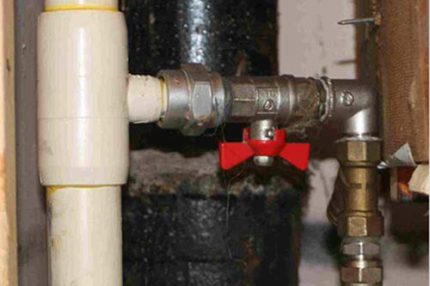
Reason number 5. The difference in diameter. If pipes of different sizes were used when laying the pipeline, fitting a larger diameter to a smaller one, this disrupts the flow of water, which can cause noise.
Reason # 6. The same problem may not be caused by an open valve or old valves (faucet), which interfere with the normal flow of fluid. In this case, a section of high pressure arises, while the sounds emitted by the turbulence of the water will be distributed to all apartments related to the riser.
Reason number 7. Sometimes monotonous noises are associated with leaking mixer. Sound may occur due to a worn gasket that seals the mounting location of this device with a tee.
Due to the pressure difference between the two pipes, constant humming may occur. In this case, enough repair the tap yourselfby replacing the gasket.

Reason # 8. A hum can occur due to a tap leak in a nearby apartment. This version may be a priority if noises are clearly heard at night, when water consumption is reduced to a minimum.
Buzz with buzz
Sometimes a specific noise is heard in the water supply communications, resembling a whistle, which increases with increasing pressure. Such a sound usually occurs when there is insufficient patency of individual fragments of the system.
There are two reasons for this:
- fully or partially closed valve;
- clogged pipe.
To exclude the first case, it is enough to check the position of the stopcock responsible for this section of the pipeline.
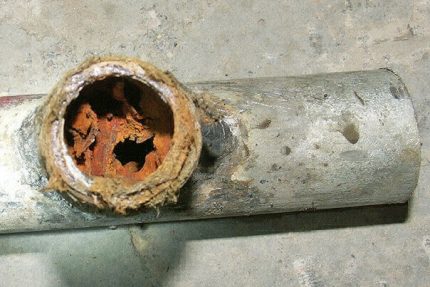
If the valve position is correct, it is necessary to check the pipes for mash. In an apartment, it is enough to disconnect the element from the mixer and clean it if necessary, using the mechanical method or pneumatic or hydraulic flushing.
If you suspect a blockage in the centralized water supply system, you must call a specialist who will find the defect and repair.
Tapping in water pipes
Sometimes in the water supply system located in the apartment, incomprehensible knocks are clearly heard. The causes of these noises can be varied.
Reason # 1. Thermal expansion of pipeline parts. Especially often this problem worries the owners of apartments equipped with steel water pipes. The reason for this is due to the special properties of the metal. If hot water begins to flow into a very cooled pipe, the steel walls begin to heat up, and this causes them to expand.
The increase in size is difficult to assess visually, but often it is enough to closely spaced parts start to touch each other, while their touch is accompanied by a knock.
To eliminate this problem, it is advisable to use plastic piping. Metal parts can be wrapped with foamed polyethylene or other reliable insulation.
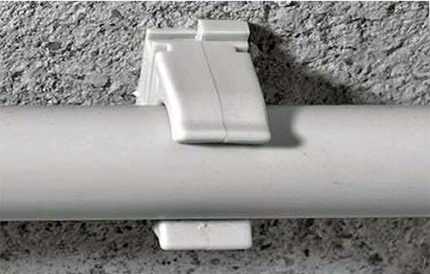
Reason number 2. Sounds in the place of fixing the pipe to the wall. A similar problem can be caused if, due to thermal expansion, the pipes begin to hit the fasteners in the wall. This can be determined by localizing the location of the noise.
To fix the problem, it is recommended to use additional fasteners, for example, brackets, to fix the structure. With noises from the riser, they can be eliminated by filling the void in the ceiling with high-quality foam.
Reason # 3. There are also errors when installing the valve. If the screw element is not installed correctly, the valve may break. A part falling into the pipe cavity will hit its inner surface, blocking the water flow. This problem must be solved immediately by calling a specialist.
Reason No. 4. Sometimes air gets into the pipes. The cause of tapping can be air congestion in pipelines. The most effective way to eliminate them is to install an air exhaust system. It also protects structural elements from corrosion and eliminates malfunctions during operation of the pump.
Noise in pipes with vibration
Sometimes when you open the tap from there comes a loud buzz, which is usually accompanied by a pronounced vibration.
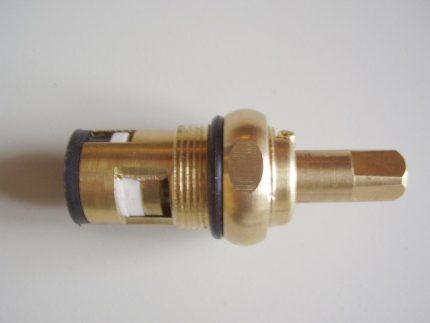
The most common cause of this malfunction is problems with the crane box, an important part of the mixer. In the case of increasing water pressure, this element blocks the pressure, creating a turbulence in the flow, due to which a hum occurs.
To diagnose such noise, it is enough to open the hot / cold water supply valves one at a time to find out where the problem is.
Most often, sounds occur in faucets involving the use of rubber gaskets. It is better to replace such models with reliable analogues with ceramic crane boxes - in this case, gaskets are part of the device design.
As a rule, the functioning of such devices is absolutely silent; the occurrence of extraneous sounds indicates an incorrect assembly.
The cause of sudden loud noises in the water supply communications, which disappear just as quickly, may be a malfunction of pipes in the neighboring apartment. In this case, you should talk with its owners.
Humming in pipes with the tap open can also be caused by the excess pressure generated in the pressure system. Usually a similar problem is peculiar to a certain time of day (peak hours), when water pressure in pipes reaches its maximum value.
This phenomenon is quite dangerous, because it is not limited to the occurrence of unpleasant sounds. The increased impact on the system can lead to a violation of the integrity of the structure, causing a breach of the tightness of the fasteners.
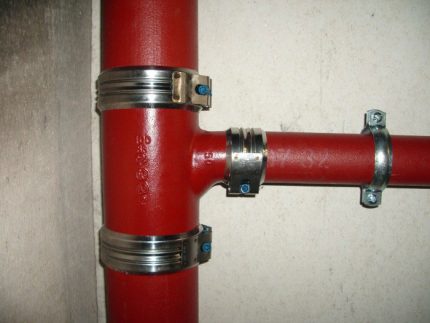
If the owners of the apartment with the newly installed plumbing complain of the buzzing and vibration of the taps, first of all it is necessary to check how correctly the joints of the mixers and pipes were made. It is important to seal all available fasteners, after which extraneous noise usually disappears.
To reduce high pressure, it is advisable to place an air chamber between the taps and pipes, making it with a special silencer or an additional piece of pipe.
A buzz can also occur in the toilet bowl, in which case the reason lies in shutoff valves - membrane or valve. To eliminate it, turn off the water and then replace the existing rubber gasket with a harder one. A washer installed under the membrane will also help eliminate sounds.
Noise in the sewer system
Extraneous noise can be heard from the sewer, while the appearance of sounds is not affected by whether communications are made of plastic or cast-iron elements. Understand the reason for the appearance of noise will help their specificity.
Tapping in a sewer pipe
A single sound going down, as a rule, is caused by a heavy object falling into the sewer pipe.It is better to avoid such situations, as this threatens with possible damage to the structure, especially if it is made of polymer pipes.
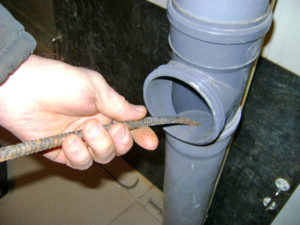
A great danger is the occasional tapping, which may indicate an existing blockage. If you suspect a congestion, you can try using special chemicals or a plunger. If such methods do not lead to a positive result, you must call the plumbing.
Whistling noise
Such sounds can occur for various reasons:
- In case of narrowing of the diameter of the pipe due to its overgrowing or existing sewage blockage. In this case, you can use the methods described above or contact a professional.
- In addition, whistling noise can be a sign of air entering the sewer system. The solution to such a problem is also better to entrust to a specialist who will not only take appropriate measures, but also carry out preventive work aimed at rationing the air.
Although whistling noises do not indicate excessively dangerous situations, they indicate problems that need to be addressed urgently.
Hum and vibration in the sewers
The buzz of a sewer riser can be caused by reasons similar to the appearance of noise in water pipes. However, in this case, you can not be afraid of a breakthrough of structural elements due to unstable pressure in the drainage system.
Sound can be eliminated by isolating the riser with foamed polyethylene. The pipe winding made with this material will not only insulate the structure, but will also effectively absorb noise.
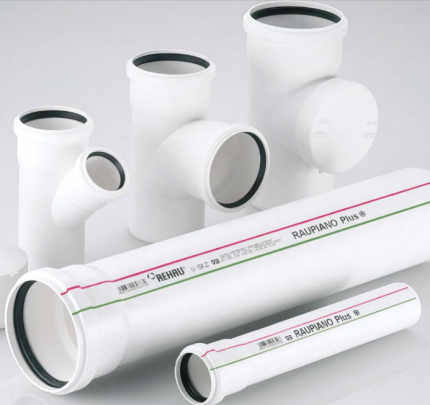
Use of sound-absorbing analogues instead of conventional pipes. Special plastic elements are on sale that are easy to recognize thanks to the marking strips on the walls. The designs made from them function absolutely silently.
The following photo selection will familiarize with the design and technological features of the silent version of the sewer system:
The principles of arranging a silent sewer are described in detail in this article.
Extraneous sounds in the heating system
Noises coming from radiators and pipes are considered commonplace for residents of houses with central heating. To avoid possible troubles, they must also be treated with utmost care.
Monotonous buzz in batteries
One of the common causes of hum in heating pipes is air entering the system. To determine airing, it is important to check the quality of heating.
If individual sections of the radiator remain cold or heat less than the neighboring ones, this indicates that air has entered the structure, which caused the hum. In order to get rid of it, as well as to establish full-fledged heating, it is important to release air from the system.
Air enters the heating battery for the following reasons:
- incorrect installation;
- insufficient pressure in the heat supply sectors;
- corrosion of metal elements of the device;
- foreign objects - debris;
- incorrect installation of individual fragments of the heating system;
- increased air content in the water;
- improper start of the heat supply system;
- lack of air duct.
To fix the problem, you must lower the air lock, which will require a radiator key or screwdriver, as well as a container for water.
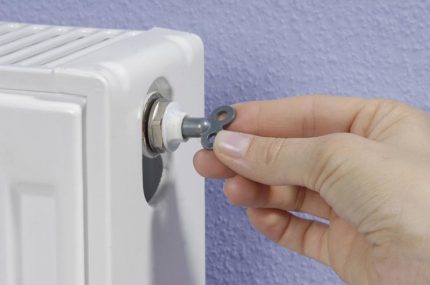
To perform this operation, you must perform the following steps:
- find a valve on the battery; in older models, there may be a valve instead;
- untwist it clockwise until a hiss of air is heard;
- bleed air until drops of liquid appear;
- wait until the water begins to flow in a steady stream;
- tighten the valve.
Some radiators have a special option for automatic air release, which further simplifies the process.
Tapping and "shooting" batteries
In metal radiators, sometimes sharp sounds resembling shots occur. Such noises are associated with the expansion factor of the metal: elements made of this material increase in size when heated, and decrease when cooled.
To avoid "shooting", it is recommended to use a special insulation, wrapping them with pipes that are near the walls.
Similar sounds can also occur if the design is incorrectly installed and the radiator mounting rules are violated.
To avoid the problem, it is advisable to strictly follow the recommendations of specialists:
- the heating battery should be located 14 cm from the floor;
- the distance from the windowsill to the battery should exceed 10 cm;
- between the wall and the radiator there should be a gap of 2-5 cm - a layer of insulation can be laid in it;
- pipes must be mounted on a flat vertical surface;
- the end face on which the air vent is mounted must be raised 1 cm.
In addition, a periodic knock may be heard in the heating system. As a rule, its cause is the difference in the diameters of the pipes that are used to create the structure.
To eliminate the malfunction, it is desirable to run a system of elements of the same size. Instead of a diaphragm, it is better to install a regulator that monitors the differential pressure of the water supply to the radiator.
Extraneous sounds may occur when using designs whose useful life has long expired. It is necessary to check the condition of the heating system, and if necessary replace the battery yourself or entrust the process to a professional.
The murmur in the batteries and pipes
Often in the pipes you can also hear the murmur and gurgling of water. Typically, this phenomenon is typical for the start of water at the beginning of the heating season.
If such noise is not associated with the start of hot water, it may indicate problems that have arisen: if an obstacle arises inside the battery, water has to flow around them, which causes extraneous sounds.
To determine the cause, you need to check the position of the valve and its performance, as well as try to determine the presence of blockage.
For prevention, you can clean the system, which can be done in two ways:
- strong water pressure;
- special chemicals followed by flushing the system with a stream of water under pressure.
If these measures do not help, you need to call a specialist: with a massive blockage, you sometimes have to resort to the help of a welder.
Sounds in the pipes with a working battery
The reason for the noise in heating may not be in the radiator, but in other elements of the system.
Riser. Sometimes the noise in the battery is caused by the leakage of water from the riser. A similar problem must be immediately fixed by yourself or with the help of a wizard called from the Housing Office.
Water pump. The buzz of this device can be caused by a number of reasons:
- the pump was installed with defects;
- the power of the device does not meet the standard indicator;
- shims were out of order;
- when the pump is operating, overheating is allowed;
- wear of individual components of the device or the entire structure.
To diagnose the pump, it is necessary to disassemble the device, for which it is advisable to contact a professional.
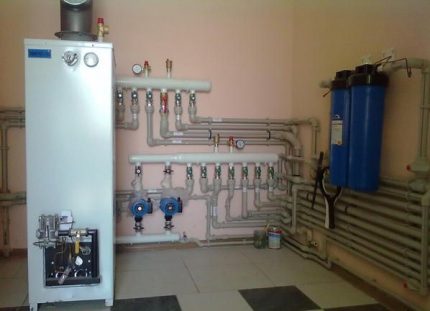
Boiler. Extraneous sounds may occur if this unit does not work properly.
Features of noise and the possibility of eliminating them largely depend on the fuel the boiler is running on:
- For solid fuel models the appearance of cod in the chimney is characteristic. To eliminate this element must be cleaned, after which the device turns on at full power.
- In gas boilers noise is most often caused by burner defects, which requires replacement of this part.
- Diesel fuel boilers sometimes they make a whistle that occurs in the nozzle due to excess soot, which interferes with heat transfer. Installing a thermostat will help to establish work.
The cause of noise can be a break in the control valve. In this case, an immediate specialist call is required, since blocking the movement of the liquid with the torn off element can lead to rupture of the heating sections.
Noise can also be made by a geyser or an electric heater. First of all, it is recommended to inspect the valve of these devices, which most often causes malfunctions.
Conclusions and useful video on the topic
Below we offer you instructions for fixing two common causes of noise.
The first video shows the step-by-step process of replacing the gasket, which allows you to get rid of loud noise accompanied by vibration.
The second video tutorial details how to bleed air from a heating battery. This process not only helps to improve the heat transfer of the radiator, but also eliminates buzzing sounds.
Before starting repairs, you need to find out why the water, sewer or heating pipes are noisy. Having established the cause of the sounds that appear, you can easily cope with the problem with your own hands or using the help of a plumber master.
Have something to supplement, or have questions about the topic? Please leave comments on the publication and participate in discussions. The contact form is located in the lower block.

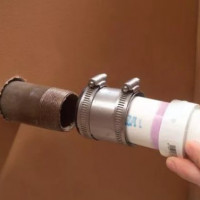 The connection of plastic pipes with metal: an analysis of the best methods and mounting nuances
The connection of plastic pipes with metal: an analysis of the best methods and mounting nuances 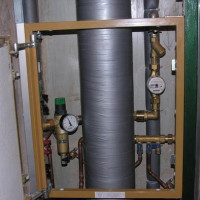 How to hide pipes in a bathroom: an overview of the best ways to mask a pipe
How to hide pipes in a bathroom: an overview of the best ways to mask a pipe 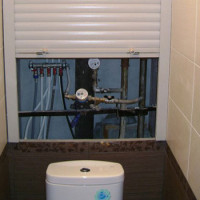 How to arrange a pipe box in the toilet: an overview of the best ways to mask the pipeline
How to arrange a pipe box in the toilet: an overview of the best ways to mask the pipeline 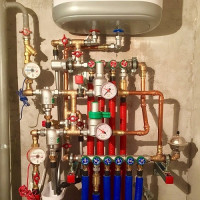 Piping in the bathroom: analysis of hidden and open piping schemes
Piping in the bathroom: analysis of hidden and open piping schemes 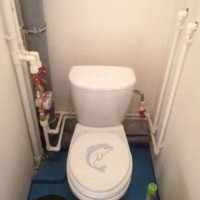 Replacing pipes in the toilet from A to Z: design, selection of building materials, installation work + error analysis
Replacing pipes in the toilet from A to Z: design, selection of building materials, installation work + error analysis 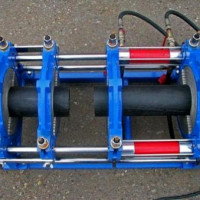 Welding polyethylene pipes: a comparison of methods + installation instructions
Welding polyethylene pipes: a comparison of methods + installation instructions 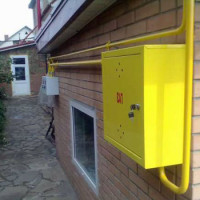 How much does it cost to connect gas to a private house: the price of organizing gas supply
How much does it cost to connect gas to a private house: the price of organizing gas supply  The best washing machines with dryer: model rating and customer tips
The best washing machines with dryer: model rating and customer tips  What is the color temperature of light and the nuances of choosing the temperature of the lamps to suit your needs
What is the color temperature of light and the nuances of choosing the temperature of the lamps to suit your needs 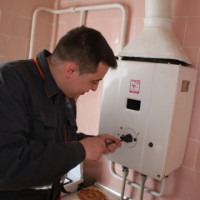 Replacement of a geyser in an apartment: replacement paperwork + basic norms and requirements
Replacement of a geyser in an apartment: replacement paperwork + basic norms and requirements
Fortunately, I only once had such a buzz in the pipes: as soon as I opened the tap, a terrible roar was heard throughout the apartment. And at closing too. Then the problem was in the mixer, it was easy to calculate, because it had been leaking for some time. The plumber called, he replaced the mixer, and the pipes immediately stopped buzzing. Escaped with a slight fright.
Wow, I have the same story, Elena! When the faucet opened, there was such a chatter, as if a rocket was taking off) Only the mixer did not leak, and we did not realize that something was wrong with it. Plumbing called, he checked everything, all the pipes. I spent a day, but it turned out that the problem was in the mixer. Once replaced, everything went away)
That is, I want to say: the buzz of pipes does not always mean problems with pipes.